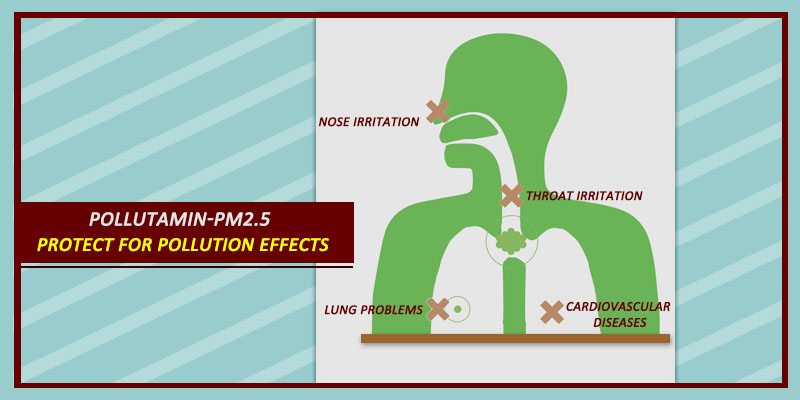The air that we inhale nowadays is totally polluted and has a lot of pollutants like exhaust particles, nitrogen oxide, particulate matter etc. All this goes in to our lungs and leads to harmful effects by attacking our immune system and cells. Free radicals are produced and they lead to inflammation being caused. In places like Delhi and other metropolitan cities, there are a lot of factors like fog and smoke that add to the pollution and make it worse. It even makes breathing difficult and is leading to many respiratory troubles and health hazards.
But there is hope at with a new product developed by Bagdara Farms called Pollutamin- PM2.5. First off, we must know what is PM 2.5. Well, let’s find out.
- PM is the Particulate matter which is the particle pollution in the air. It is the mixture of liquid droplets and the solid particles that are in the air.
- There are some particles like dust, smoke, soot which are large and can be seen with the naked eye. Then there are some other particles that can only be detected with the help of a microscope as they are so tiny.
- These are PM 2.5 which are fine particles that can be inhaled with the air.
Where does PM come from?
- The particulate matter particles are in various shapes and sizes and can come from various kinds of chemicals that are mixed in the air.
- Some may come directly from a source like fires, construction sites, fields that are being harvested etc.
- Whereas there are other particles that are the result of complex reactions that take place in the atmosphere. These are sulphur oxide, nitrogen oxides, carbon monoxide etc. They may come from vehicles, power plants and factories.
What effect does PM have?
- Since PM is so small, it can be inhaled along with the air and lead to worrisome health issues.
- The particles that are less than 10 micrometers in diameters are most dangerous since they get deep set into the lungs or may enter the bloodstream causing some serious health hazards.
- 5 is the main cause of the lower visibility in cities like Delhi that is the current problem.
- The particles of PM 2.5 can go very deep into the respiratory tract and can reach the lungs too. Short-term effects of these particles on the health are running nose, irritation in the throat and eyes, coughing and short breath. But prolonged PM2.5 exposure can lead to heart diseases and asthma.
- There may also be increased rate of deaths due to lung cancer and heart conditions, chronic bronchitis and reduced function of the lungs. All these are due to prolonged exposure to PM2.5.
There is no need to worry as we have the best product at your service. Making use of the antioxidant properties of curcumin, our miracle component called Pollutamin- PM2.5 will provide the protection from pollution that you need for yourself and your family members. Incorporate it in your daily intake and the benefits that you will get from it will be manifold.
The antioxidant properties of curcumin are very much present in Pollutamin -PM 2.5 which will protect you from the polluted air that we all have to forcefully breathe leading to hazardous troubles and health worries.
Following are the many amazing qualities that Pollutamin PM 2.5 from Bagdara Farms possesses:
- It is gluten free and very helpful to lower the effect of the harmful air we breathe.
- Since it is farm grown, it is totally free of chemicals and pesticides and harmful fertilizers as well.
- It has amazing anti-viral and anti-fungal properties that make it best for warding off infections like bronchitis and other lung and heart worries.
- It is also anti-inflammatory owing to the curcumin content that it has which makes it effective against lung problems that happen due to particulate matter in the contaminated air.
Manufactured from home grown processes that are totally organic, Pollutamin-PM2.5 is your ideal bet for lessening the harmful and hazardous effects to the health of your family that is caused due to the prevalent pollution in cities these days. Order your jar of health and wellness from Bagdara right away!
Click here for more details : https://www.ncbi.nlm.nih.gov/pubmed/27600540

